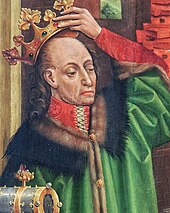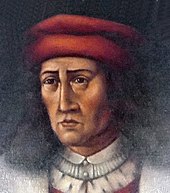Lutsk Congress
Congress of European Monarchs in Lutsk (also known as the Lutsk Prince's Congress ) was a meeting of secular and clerical dignitaries from Northern , Southern , Central and Eastern Europe that took place in the city of Lutsk in 1429 to clarify political and economic questions and with the aim of establishing a common front against the To achieve expansion of the Ottoman Empire .
background
In the Union of Krewo , 1385, the political relationship between Lithuania and Poland was regulated, which prevented the Lithuanian prince Vytautas , who was under the suzerainty of his cousin and Polish king Jogaila , from expanding his rights and achieving independence. The Royal Polish Council suspiciously observed the actions of the Lithuanian Grand Duke with regard to his foreign relations. In 1392 Vytautas was raised to the rank of Grand Duke of Lithuania, where he wanted to eliminate foreign influences from the beginning and strived for a sovereign principality. Sigismund of Luxembourg , King of Hungary , Germany and Bohemia , encouraged Vytautas to have a royal coronation. Sigismund strove to set a wedge between Lithuania and Poland so that the Kingdom of Poland no longer had any influence on it. Sigismund also pursued other interests and sought an alliance with the Lithuanians against Poland. The question of the coronation of Vytautas and the establishment of a Lithuanian-Ruthenian kingdom should be discussed during this congress. Vytautas chose Lutsk as the venue where in 1429 the European monarchs discussed their own and common problems.
The Congress
At the beginning of January 1429 the guests arrived in the city, 15,000 people, more than the population. At their disposal were farms and houses in Lutsk and the surrounding area. Hundreds of barrels of wine and beer , as well as herds of elk , bison , wild boar , ox , and sheep were prepared. The cutlery was made of gold and silver .
Congress participants and representatives
- Grand Duke Vytautas acted as host together with his Lithuanian and Ruthenian vassals, including representatives of the Princely Houses Holszański , Sanguszko , Czetwertyński , Czartoryski , Ostrogski , Drucki , Korecki , as well as Catholic , Orthodox , Armenian and Jewish dignitaries.
Representatives of the following countries came to Lutsk:
- Kingdom of Poland : King . Władysław II Jagiełło (Jogaila) and his wife Sophia of Halshany , Zbigniew Oleśnicki (cardinal and bishop of Krakow), Jan Tarnowski (Royal Marshal and Voivod ), Wojciech Jastrzębiec (Kronkanzler and Primate of Poland), as well as many other representatives of the Polish nobility
- Kingdom of Germany , Kingdom of Hungary , Kingdom of Bohemia , Kingdom of Croatia : Emperor and King Sigismund of Luxembourg with his wife Barbara von Cilli and his vassals, the representatives of the German, Bohemian, Hungarian and Croatian nobility
- Kingdom of Denmark , Kingdom of Norway and Kingdom of Sweden : King Eric of Pomerania .
- Teutonic Order State in Livonia : Landmaster of the Livonian Order with his knights
- Teutonic order state in Prussia : Grand Master Paul von Rusdorf with his knights
- Papal states : Pope Martin V sent his messenger, the Dominican Andreas
- Byzantine Empire : Representative of Emperor John VIII.
- Grand Duchy of Moscow : Grand Duke Vasily II.
- Metropolitan of Kiev : Photios .
- Principality of Ryazan : Prince Ivan Fyodorowitsch
- Principality of Tver : Prince Boris Alexandrovich
- Khans of the Perekop, Don and Volga hordes
The first to arrive in Lutsk was the Polish delegation. The German King Sigismund was late, arrived between January 20th and 30th and was received particularly pompously. The hosts drove to meet him far beyond the city limits - Vytautas and Jogaila at the top - with representatives from the Russian, Latin, Armenian, Jewish and Karaite communities. The guests celebrated and talked until the diplomatic negotiations began. 700 barrels of honey, wine, malvasia and other beverages, 700 oxen, 1,400 sheep, hundreds of moose, wild boar and other dishes were consumed daily . In the breaks between discussions, the guests spent the time with various amusements, jousting tournaments or hunting. The alleged court jester Genne entertained the guests at Vytauta's court, but was, as it later turned out, a disguised spy of Sigismund. The diplomatic meeting took place in the princely chamber in the upper part of Lutsk Castle .
Problems that should be resolved at the Congress
- Moldova question: Hungary and Poland laid claim to the principality of Moldova . In the fight against the Turks, Moldova was supposed to side with Sigismund after the treaty of 1412, but violated its obligations, whereupon Sigismund recommended the division of the country between Poland and Hungary.
- Vytautas' coronation: In order to draw Vytautas' attention to the Kingdom of Bohemia and to weaken Poland, Sigismund discussed Vytautas' status as the future king of Lithuania for a long time. Vytautas wanted the same thing, but the Poles opposed a "Kingdom of Lithuania". They said that the Lithuanians had no right to neglect the obligations of the Union of Krewo. Thus, the coronation was postponed to the next congress in Vilnius .
- Founding of an anti-Turkish coalition: the monarchs, whose interests lay in the Balkans and the Danube regions, feared the threats posed by the Ottoman Turks. Although relations between the Ottoman Empire and the Byzantine Empire were strained, the Venetian Turkish War of 1423–1430 and the siege of Constantinople in 1422 left no hope of peaceful coexistence. The Hungarian and German kings proposed to Lithuania and Poland to create an anti-Turkish coalition. Poland initially withdrew, but agreed after other countries joined.
- Hanseatic Issue: The Nordic King Erik VII was particularly interested in regulating relations with the German Hanseatic cities , because the battle of the Kingdom of Denmark against them weakened the Danish state economically.
- Religious questions: In the Congress the question of the agreement of the Catholic and Orthodox Church was raised. Vytautas wanted an independent church in his principality. In addition, the German king and the Pope's ambassador supported a union. The clergy did not want to take part in this discussion, so there were no results. The split in the Catholic Church and the activities of the Hussites in Bohemia were discussed .
- Trade rules: Taxes and shipping in the Baltic Sea area were discussed.
The most important question, the coronation of Vytautas, which Sigismund and Vytautas in particular were waiting for a successful answer, was canceled by the Poles and the Polish delegation left the city. Vytautas' coronation was scheduled for August next year. Because of the Polish resistance, the event was postponed to September 1430. The coronation acts were prepared in Sigismund's office. Lithuania was proclaimed the Eternal Kingdom. The Poles, however, prevented the transport of the crown to Lithuania, so that the solemn coronation did not take place.
literature
- Stecki: Łuck starożytny i dzisiejszy , - Kraków, 1876 - p. 54
- Adam Wojnicz: Łuck na Wołyniu , - Łuck, 1922 - p. 11
- Т.Садовнік, О.Бірюліна, В.Баран. Європейський з'їзд 1429 року в Луцьку. - Луцьк, 2006 ISBN 966-361-133-2





